- Home
- Matthew Pearl
The Technologists: A Novel Page 3
The Technologists: A Novel Read online
Page 3
People moved in for better views, marveling at the notion of machinery illuminating the streets all at once. The machine rattled as something hard struck it. It was a rock. A second one grazed Rogers’s shoulder and another cracked the glass of the lantern above them, pitching them into darkness. Marcus felt the glass shards rain down on his hat and shoulder.
Three men emerged from a cluster of trees. Now they launched a volley of rotten tomatoes.
“Technology will bring God’s wrath!” yelled a man dressed smartly in a crisp dark-blue Union army tunic, light-blue trousers, and kid-leather gloves. “Last month, a girl’s scalp was torn off when her hair was caught in a factory machine she was operating in Lowell. Torn off! What was it that befell the ships at the docks last week? Ask them to explain that in their classrooms, if they dare!”
Marcus guided President Rogers away from the falling glass.
“I’ll send for a policeman at once, President Rogers,” said Albert excitedly. He had ducked behind a group of faculty members at the outbreak of the commotion.
“No, Mr. Hall,” Rogers said. “Do not molest them. They’re from the trade unions.”
“Hall’s right, President Rogers! It’s a scrubby thing to do!” Bob protested. “Nothing burns me like anti-machine mania. This will make their own labors easier and safer.”
“Mr. Richards,” Rogers said calmly, “some lamplighters will lose their positions once our invention has been fully installed. Consider that before consulting your anger.”
“Get inside the carriage. Please, Professor! Quickly!” the chambermaid urged him, leading him briskly to the street.
“Mr. Mansfield,” Rogers said, beckoning to Marcus. “We do not want further trouble.”
He followed Rogers’s eyes and saw that Hammie was stomping toward the reformers.
Hammie had unleashed his wrath before Marcus could reach him. “Take your rocks and rioting elsewhere, you ruffians! All the scum of the trades with all their bluster won’t frighten a Tech man.” He turned to Marcus, who put himself between the magnate’s son and the agitators. “Move away, will you, Mansfield? I have the situation in hand!”
“Hammie, let’s mind our place.”
“Don’t tell me about my place! They shoot out windows, or put explosives in a foreman’s desk from time to time at the locomotive works. But they are all brag, Mansfield. Especially Rapler here—he may act like a workingman but his true occupation is to collect fees from poor souls who know no better.”
One of the other agitators lunged at Hammie, who stumbled and nearly fell over. Marcus steadied him, but Hammie pulled away from him, dizzy and humiliated.
“Hands off, Mansfield, I’ll—Officer, Officer! Assault!” Hammie cried out to a policeman who was approaching from Berkeley Street. The policeman stopped but did nothing.
“You should know that officer’s brother is in the bricklayers’ union,” explained Rapler, the uniformed man, who, now that he was not shouting, spoke with an impressively urbane tone. He was missing what would have been his two front teeth. “We’ve asked him here to ensure our safety from easily excitable young men like you.”
“You have all had your say,” Marcus said politely. “Look around. You see? People are leaving. Please follow their example.”
Rapler studied him with interest. “What do you want? All of Boston’s jobs lost to machines, perhaps.”
“We want nothing at our Institute except to find the truth,” said Marcus. “You might have heard President Rogers say that if you weren’t throwing your rocks.”
“And how powerful must you become through it, laddie? Has not man already overstepped his maker, if he does not know where his power ends?”
“It ends when mankind no longer needs the protections technology provides.”
Rapler motioned to the men around him. “The men and women who join our cause are not anti-science. We simply see a science today set to run away with man. The machines you gentlemen—and one errant lady, as I understand it—at the Institute create will become so complicated that they will control us instead of our mastering them. Imagine a future when, with a single malfunction of your machines, man will live in the dark without memory of how to light a candle. He will be stranded without ability to transport himself with feet rather than steel rails. The machine is inanimate and heartless. Our unions respect the intelligence of man to act, to make decisions only man is capable of. Otherwise, we become merely tools of our tools. How will you protect us from that?” The speaker seemed satisfied when Marcus decided not to prolong the confrontation. “Fall in!”
Rapler locked arms with the other union men. They sang as they marched away.
Resolve by your native soil,
Resolve by your fathers’ graves,
You will live by your honest toil,
But never consent to be slaves!
“At least they’re gone,” Bob said a few moments later. “And they couldn’t stop us from demonstrating the circuit!” he crowed.
“But the people who came will remember only that they broke our lamp,” Marcus said, “not that the lights went on.”
V
Positively No Admittance
WHEN ONE ENTERED, one’s senses came under attack. An amalgam of odors hung in the air, fresh fumes mixing with old ones that never dissipated. A film of dust clouded the eyes—not from a lack of tidiness (though the place was wonderfully untidy), but from the shut-in quarters and microscopic particles, some crystalline, others incandescent, floating in the air.
Touch a surface at one’s peril; it was likely to be burning hot or morbidly cold without warning. Four furnaces made of clay, brick, and stone sat in different locations, evidence of each one’s different purpose in the residue of its ash pan; tongs hung near each, ready to remove or adjust the smoldering contents.
A congealed substance had melted over one portion of the floor and now sparkled like gold. On the wall behind it, the bricks had been charred black from an accidental explosion in the not distant past. A table in the center of the main room stood within a glass enclosure; on it sat a copper box filled with sand. A pipe entered the box from a burner, and nearby were the glass crucibles, blowpipes, vessels, and other apparatus used to manipulate gases.
Gasometers, gauges, air pumps, and troughs of water and of galvanic fluid filled the rest of the chamber, their uses well beyond the comprehension of any visitor. Indeed, it seemed the whole world could be made, or remade, or undone in this room, with all these gangly and imposing tools, in a single day.
On a standing desk, a thick ledger was opened to a page near the middle that listed weights and measurements, seemingly the only volume a visitor might notice among the clutter of equipment along the tables, shelves, and cabinets. The endeavors under way here had not been published in a book, and never would be.
Of course, there would be no visitors. Nothing in this place was for public view. The hand that now neatly wrote in the ledger was suddenly stilled by temptation. That temptation? The nearby window, and specifically the delicious view beyond its thick shutters. The glass pane squared the harbor in the distance, where ships with cranes and machines continued repairs on the piers in the early dawn: Boston shaken by a hint of true disaster.
But even with almost a week passing, the meaning of that hint had not yet been comprehended by this sluggish city of intellectual giants. The sublime satisfaction at the sight of the crippled wharves was only a first step. This morning would bring true progress. The wet tip of the pen methodically added a fresh record in the ledger to mark the occasion.
VI
A Good Morning
THE DAY THAT had brought Marcus the first inkling that he could ever aspire to college came a little more than four and a half years ago. He was working at the Hammond Locomotive Works when he noticed a stranger passing through. Six feet tall and upright, his weathered, noble face framed by long silver hair, he was a philosopher in a place with no philosophy. All of the machinists and apprentices ben
t diligently to their work while he inspected the floor.
“Who is that?” Marcus nudged Frank Brewer, the machinist posted with him on the drill bench.
“Someone,” Frank answered, perfectly capturing the tension of the others on the floor. The whole length of Frank’s body vibrated as he completed the revolution of the drill. He had bushy black hair and eyebrows and a face that was more manly than handsome. Although his limbs were sinewy, his tall, lean frame was so angular that he appeared to be just bones beneath clothing. While Marcus was in control of his machine, Frank in his skeletal way seemed almost to blend with the complex equipment he operated, its fleshy extension.
Even after their exhausting twelve-hour days at the machine shop, Frank would still find time to carve miniature sculptures in his boardinghouse bedroom—just as he had in the midst of infinitely harsher circumstances where he and Marcus had met. It was that patience and meticulous attention when no one else was watching, that, to Marcus, was Frank Brewer in a nutshell. His favorite piece of Frank’s was a bronze statuette of the Headless Horseman from “The Legend of Sleepy Hollow.” Once, he’d suggested Frank sculpt Ichabod Crane to match it. It was only later that Marcus discovered, to his dismay, that Frank was teased for sharing the gawky features “loosely hung together” of the famous literary character.
As the elegant older man was crossing the shop floor, Marcus kept working. Maybe his intense concentration was what caught the eye of William Barton Rogers, who paused at their station. Outsiders usually appeared to be in visible pain with the deafening noise of the shop ringing in their ears, the sharp metallic clicks and buzzing of the giant machines. But not this man. More unexpected, after he introduced himself, he began talking about a college he was organizing.
“Would this school of yours be dreadful expensive?” Frank asked. “You say Institute of …?”
“Technology, my son.”
Frank mouthed the word back to himself with an intrigued smile, showing teeth that were small and round.
“We are developing plans for students to be able to work for the college, if necessary,” continued the scientist.
“Well! I was not cursed with a fortune,” Frank said, sucking his teeth. “Four years without an income surrounded by collegey aristocrat dolts and dandies wouldn’t much help, would it, sir? Ha!”
Marcus laughed along with Frank.
The serene visitor turned next to Marcus. “What are you about, young fellow? Have you thought about college?”
Chauncy Hammond, Sr., the president of the locomotive works, joined them.
“Rest your hands for a moment, man,” Hammond said to Marcus. “Mr. Mansfield is one of our best machine men on the floor, Professor Rogers. There is no problem his hands seem unable to solve. Boston is growing out of its skin, men; there is talk of the city swallowing Brookline and Cambridge into our borders after we finish chewing over Roxbury. There will be a great need for new machines and railroads to be built and the engineers to do it. You know, Mansfield, that my own Junior is going to attend the professor’s institution as part of the first class.”
Frank chanced a smirk at Marcus. Chauncy Hammond, Jr.—Hammie—would of course have a place. Earned or not.
Hammie had spent the previous summer as a draftsman at the locomotive works, and during that period had avoided the hard-pressed machinists. His air of aloofness and off-putting mannerisms—even when he smiled or laughed, he was unsocial—made him seem a relic of an older Boston. Hammie might as well have strutted about in a three-cornered hat and stockings.
“Don’t mind my friend’s reticence,” Frank said, the latter word spoken with the eager emphasis of one who read a page of Webster’s each night. “His tongue takes a holiday sometimes. I don’t s’pose he’s more ashamed of being uneducated than the lot of us. He could be a foreman of one of the departments here—both of us will one day, I wager.”
“I suppose I hadn’t ever thought anything about college,” Marcus finally answered for himself, shaking out the numbness from his right hand.
“Would you?” the visitor asked, his quick eyes scanning Marcus’s hand before returning upward.
“Sir, I have only a common school education, and my family hasn’t any money. Besides, I don’t know any Latin.” He looked across the bench to see if he had said the right thing. Frank shrugged: Facts were facts.
But Rogers flashed his unusual, magnetic smile. “Latin? Think nothing of such things, my son. The old system of education is passing. We are doing something very different. Something new. There are those who fear it, of course, among my colleagues. I need the right young men who will show them how wrong they are.”
* * *
WITH THE FIRST LIGHT Friday morning Marcus resumed picking up broken glass and other debris from the field outside the Institute building. Under a light rain and dim sky, it was slow work to find the small, razor-sharp shards and avoid cutting himself.
The previous night, after the union agitators had scattered, a reporter who had come to witness the lighting demonstration accosted Rogers as he was being conducted up the steps into his carriage. “President Rogers, is it true what we have heard about the incident at the harbor? That such a strange phenomenon was no mere accident, and if not produced by wizard’s work, must be the result of some kind of scientific manipulation?”
“Is that what the newspapers will print,” asked Rogers warily.
“Already have today, sir.”
A dark shadow passed over Rogers’s face. “I understand no more about what happened than you do,” he said, brushing off tomato remnants from his suit. “If you’ll kindly pardon me.”
The driver closed the door, sealing Rogers in and leaving the frustrated reporter below.
With the commotion subsided, Bob, flustered and frustrated, also left to return to his lodging house. Only Albert Hall remained with Marcus. Hall, his fat cheeks still flush from excitement, planted himself expectantly at Marcus’s elbow. He hooked his thumbs in the armholes of his green-and-black-speckled vest, which was an imitation of a fashion that had been the very latest a year and a half ago.
“Hall, what do you want?”
“Aren’t you going to clean this all up?” he replied impatiently. “It’s your duty, you know, as a charity scholar.”
“You’re a charity scholar.”
Albert blinked, tossed the cowlick from his forehead, and omitted a pitying sigh. His sigh was superfluous. Every syllable he spoke sounded like it was carried on an exhale. “Look here, Mansfield, for reasons I thought would be obvious to you by now, you’re given tasks as part of your financial arrangement suited toward, shall we say, physical exertion. In contrast, it is my duty to see that the students at the Institute follow the rules and fulfill their individual responsibilities, pay their overdue bills and breakage fees and preserve perfect order in and around the building. Trust me, you don’t want that degree of reliance on you. We may seem the same, you and me, Mansfield, because of our humble standings, but the difference between us is that I freely accept the restrictions on me without shame. Now, the rules in this case would dictate that you tidy up without any help from me.”
“You’re right. We aren’t the same,” Marcus said sarcastically, though his confidence had strained a little under Albert’s words.
“Excellent.” Albert smiled, shaking his hand and gathering his belongings. “I thought we’d understand each other sooner or later. Good night, Mansfield!”
But even with the benefit of the gaslight, the evening had grown too dark for Marcus to finish cleaning up, so he decided to take the train back to Newburyport. He returned to Boston on the earliest train.
As he crawled and crouched with the bag of glass, he heard the gravel crunching and looked up to find he was not alone. Bryant Tilden. He’d even prefer Albert to Tilden. Marcus pretended not to notice him.
“Bootlicking the professors again, Mr. Toady?” Tilden said, snapping his fingers as he spoke. He was short but muscular with a square
chin.
“I’m not in the right spirits for sparring, Tilden.”
When he first enrolled at the Institute, Marcus expected that his fellow college students would be sophisticated gentlemen who swore only in Latin. Exemplars of Boston manners and New England sobriety—or, as his friend Frank Brewer would put it, aristocrat dolts. That was exactly how they appeared the first day freshman year. But after a week or so, they seemed to change before his eyes into fast and silly boys who preferred sport and pranks over pretense. Looking back, he was relieved to abandon the mythological collegey of his imagination.
Still, Marcus could not help but marvel now that Tilden had lasted to their fourth year. When they were freshmen, he caught him writing out plane-trigonometry formulas on his shirt cuffs. Though Marcus had never said a word to Tilden or anyone else, Tilden never forgave him for knowing the shaky ground he walked on. Tilden prodded him so much when they were freshmen that one day Marcus took him by the collar. It was in the middle of a lecture, and Tilden’s allies joined in, instantly locking the entire freshman class of twenty-five—the entire enrollment of the college, before ten gradually dropped out—in a melee. Rogers did not try to pry the young men apart, which would have been fruitless. Instead, he removed a gyroscope he had just bought for the Institute and set it in motion. The boys one by one stopped their fighting. Fixing neckties and tucking in shirt flaps, they passed around the awkwardly spinning object; it was the first time they had ever laid eyes on a device like it and, they suspected, the first time any college freshmen in the country ever had. Nobody was punished for the fight—it had not gotten very far, and it would have been messy to sort out. Marcus was lucky; the college could not cook their golden geese such as Tilden, whose father was a steel magnate, but as a charity scholar Marcus was there by the grace of the faculty. It was the first and last time he had let anger get the better of him as a Tech student.

 The Dante Club
The Dante Club Dante Club
Dante Club The Poe Shadow
The Poe Shadow The Dante Chamber
The Dante Chamber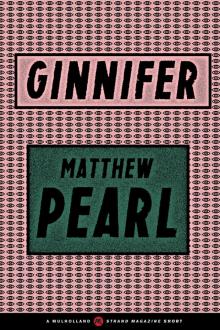 Ginnifer
Ginnifer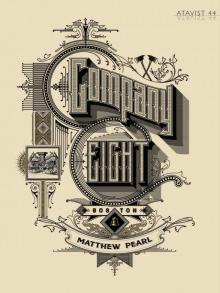 Company Eight
Company Eight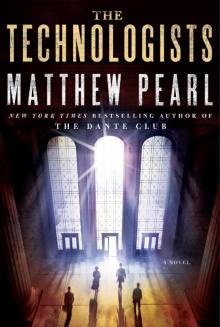 The Technologists
The Technologists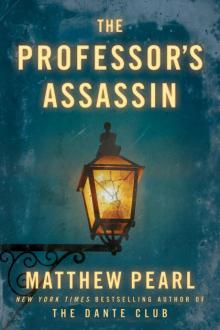 The Professor's Assassin
The Professor's Assassin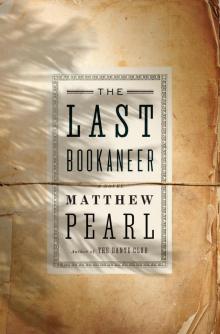 The Last Bookaneer
The Last Bookaneer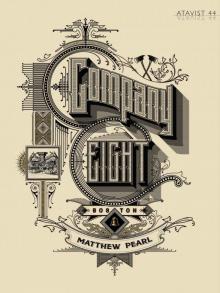 Company Eight (Kindle Single)
Company Eight (Kindle Single)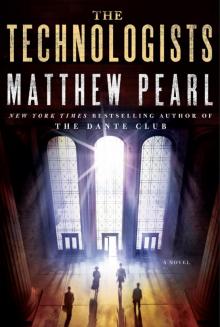 The Technologists: A Novel
The Technologists: A Novel The Last Dickens
The Last Dickens